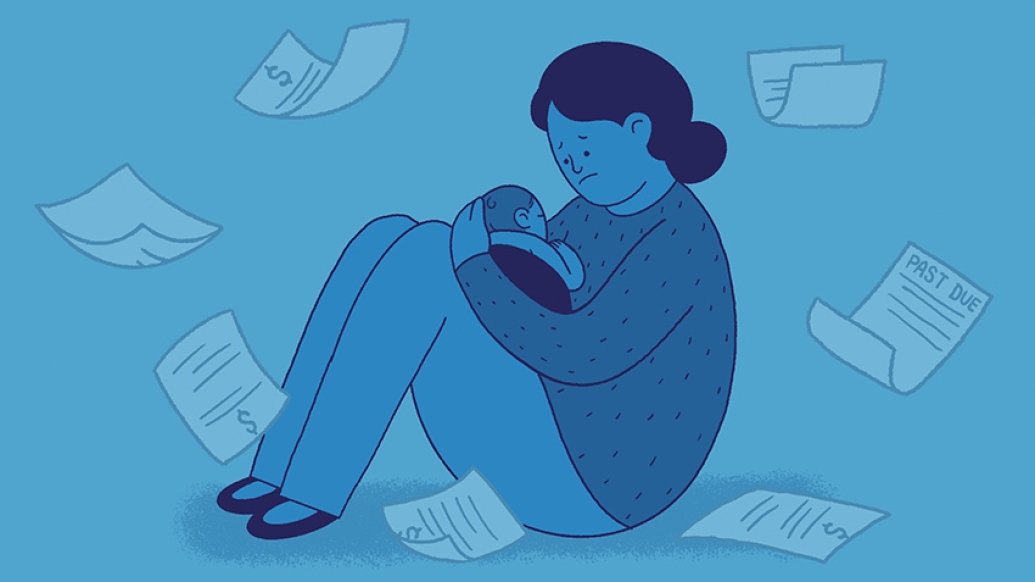Over a five-year period, 24% of pregnant and postpartum women in study reported unmet health care needs due to cost; 60% reported health care unaffordability.
5:00 AM
Author |

Pregnancy and the year after delivery is a critical period for health care access for birthing individuals and babies.
But this may also be a time when families face great financial strain that could prevent them from getting crucial health services. Nearly a fourth of pregnant and recently pregnant women in a new study say they've been unable to afford necessary health care, and three fifths report concern about paying medical bills.
More than half of the women in the five-year study also described general financial stress over other expenses, including monthly bills, housing costs, minimum payments on credit cards or maintaining standard of living.
"Our study suggests that financial hardship is exceedingly common among the birthing population in the United States, with many parents experiencing unmet health care need due to cost, health care unaffordability, and general financial stress," said senior author Michelle Moniz, M.D., M.Sc., an obstetrician gynecologist at University of Michigan Health Von Voigtlander Women's Hospital.
The findings, which appear in JAMA Network Open, include a national sample of 3,509 peripartum women, weighted to represent more than 1 million women, between 2013 to 2018.
"Prenatal and postpartum visits provide essential preventive services for both women and infants, including vaccinations, screening for gestational diabetes and anemia, and an opportunity for early diagnosis and management of pregnancy complications," Moniz said. "But for some, the cost of health care is a barrier to utilizing these recommended services."
Financial burdens impact maternal care
Women with private insurance and those living on lower incomes were more likely to experience unaffordable health care than women with public insurance and those with higher incomes, Moniz and colleagues found.
The 24% of women with unmet health care need reported being unable to afford medical care, prescription medications, eyeglasses, or mental health care or said that they or a family member delayed or deferred needed care due to cost.
MORE FROM THE LAB: Subscribe to our weekly newsletter
"People who delay or forego medical care due to financial barriers are more likely to report worse health," Moniz said. "Financial hardship has also been shown to be associated with poor mental health."
The 60% of women reporting health care unaffordability described feeling worried about potential medical bills, existing medical debt, or problems paying off medical bills.
Our study suggests that financial hardship is exceedingly common among the birthing population in the United States.Michelle Moniz, M.D., M.Sc.
Financial strain may reflect families' out-of-pocket costs for pregnancy, postpartum, and newborn healthcare as well as other circumstances contributing to financial instability, Moniz said. She notes that household income often falls dramatically around the time of childbirth, and that the United States is the only resourced country without mandatory paid parental leave.
Policies and programs that address social needs during pregnancy, she said, have clear benefits for birth and developmental outcomes, such as preterm birth and low birth weight while helping to alleviate general financial stress and making sure that every family gets the best start in life.
Improving coverage and affordability of recommended health services
Rates of unmet health care need and health care unaffordability were highest among peripartum women without health insurance coverage, researchers found. Disruptions in insurance coverage are common during pregnancy and the first six months postpartum, affecting women with both private and public insurance, Moniz says.
"These data may help explain why lack of insurance during pregnancy is associated with inadequate and late prenatal care and higher risk of adverse birth outcomes," Moniz said.
"Our findings underscore the importance of stable insurance coverage for pregnant and postpartum women."
Notably, the "uninsured" group was by far the smallest group in the study. The strikingly high prevalence of healthcare unaffordability among the commercially insured group is notable. "While we often think of this group as 'taken care of,'" Moniz said, "About 1/3 of privately insured women live in low-income households. Our findings suggest urgent need to improve healthcare affordability among the privately insured. Reducing or eliminating out-of-pocket costs—that is, copayments, co-insurance and deductible payments—for recommended healthcare is a key strategy to improving economic stability for families and ensuring that families get needed healthcare services."
There has been some progress through policies like the Patient Protection and Affordable Care Act, which requires coverage for certain prenatal services without cost-sharing for those with private insurance. Other provisions also seek to broadly expand coverage and affordability for all women of reproductive age.
Like Podcasts? Add the Michigan Medicine News Break on iTunes, Google Podcasts or anywhere you listen to podcasts.
Such steps benefit women overall, with improved insurance coverage and reduced cost-related barriers to care, especially among those living on low incomes, Moniz says.
Still, financial barriers continue to affect both those without insurance who are exposed to full charges for health care services and those with insurance via copayments, coinsurance and deductibles.
"Improving coverage and affordability of recommended health care for peripartum women is a decades-long policy goal," Moniz said. "We need more targeted interventions to promote overall economic security among peripartum women and their growing families."
Additional Authors include Kathryn Taylor, M.D., of University of Michigan and Stanford University, and Sarah Compton, Ph.D., M.P.H., Giselle Kolenic, M.A., John Scott, M.D., Nora Becker, M.D., and Vanessa K Dalton, M.D., M.P.H., all of U-M.
Paper cited: "Financial Hardship Among Pregnant and Postpartum Women in the United States," JAMA Network Open. DOI: 10.1001/jamanetworkopen.2021.32103

Explore a variety of healthcare news & stories by visiting the Health Lab home page for more articles.

Department of Communication at Michigan Medicine
Want top health & research news weekly? Sign up for Health Lab’s newsletters today!





